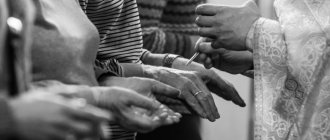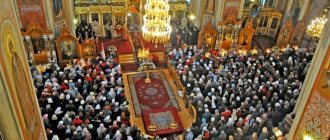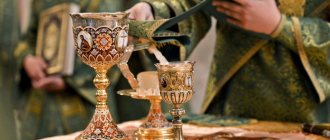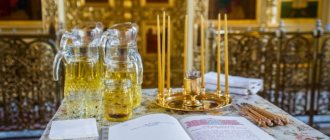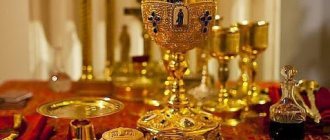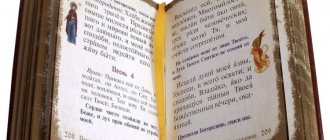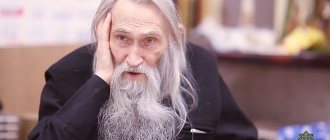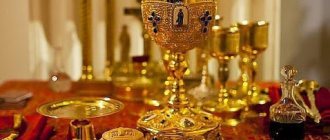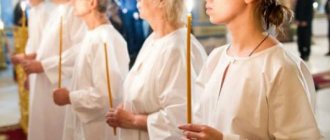Confirmation is inseparably linked with the Sacrament of Baptism. After immersion in the font, the newly baptized person is anointed with holy chrism. This has great spiritual meaning.
A little history
Even in the time of the apostles, there was the laying on of the hands of a priest on a newly baptized person, which meant the descent of the Holy Spirit on a person. This custom was replaced by anointing. Saint Gregory the Theologian wrote about this Sacrament.
This sacrament is also found in Catholicism, because it appeared even before the division of the church. But Protestants do not have it.
The Holy Scriptures often mention the anointing of people with myrrh. In the Old Testament, high priests, prophets and kings were anointed with myrrh. The New Testament tells how a woman anointed the Savior’s feet with ointment. And in another place - how she broke a jar of ointment over His head, which caused the indignation of the money-loving Judas.
Confirmation was a rite of special veneration of a person. In the Gospel, the woman did this as a sign of special gratitude to Christ for forgiving her sins and healing her.
Without confirmation, the sacrament of baptism is considered incomplete. Anointing with myrrh personifies the descent of Divine Grace onto the person being baptized.
In cases where the baptism of the baby was performed by the parents due to impending death, and if the child survived, he is brought to the temple, where the priest performs confirmation. The same thing happens to people who were baptized in the Old Believer Church and then decided to convert to Orthodoxy.
What is unction in Orthodoxy, why is it necessary to undergo unction?
Unction in church
Unction, or also called unction, is a sacrament. There are 7 sacraments in the Orthodox Church, a believer tries to observe them. These sacraments were established and observed by Christ himself with his disciples, and he commanded us to do so. These are the sacraments:
- Sacrament of Baptism . We encounter it in infancy or as adults, when a person is baptized in the church. It looks like immersing or pouring water on the baby 3 times and saying a prayer.
- Sacrament of Confirmation . The priest in the church uses a brush to anoint with church oil in the form of a cross - the forehead, chest, arms, legs of a newly baptized person, usually an infant.
- Sacrament of Marriage . We can observe it during the wedding of the newlyweds in the church, and the placing of crowns on the heads of the bride and groom.
- Sacrament of Communion . Holy Communion in the form of the Body and Blood of Christ is given to us by the priest with words of prayer in church after we confess our sins. As a sign of remission of sins, we receive a spoonful of Holy Communion, then wash it down with water.
- Sacrament of Unction . If it is God’s will, then after unction a seriously ill person can be healed. During this sacrament, seven prayers are read, usually by several clergy. After each prayer, the priest mentions the name of the sick person and anoints his forehead, chest and hands with blessed oil, and after the last prayer the priest places the Gospel on the sick person’s head and asks God for forgiveness of his sins.
- Sacrament of Penance . We come to church to the priest and want to confess our sins to him. In response, the priest orders us to adhere to a short fast (not to eat meat, eggs or dairy), not to sin, and to read prayers every day. After a certain time, we come to church again, tell the priest about the sins we have committed, deeply regretting it. If the priest undertakes to forgive you your sins, he reads 2 prayers, reconciling and asking for mercy on you before God.
- Sacrament of the Priesthood . This Sacrament is intended for those who have decided to devote themselves to God - clergy upon receiving the rank.
According to church ministers, during unction, a person is absolved of those sins that he does not realize are sins or has forgotten about them, and does not mention in confession. Unction can be carried out both for seriously ill people at home and for sick people who can come to church. Priests refuse to offer unction only to unconscious people and violent patients with mental illness.
Definition
The word quite obviously consists of two - “mirror” and “anointing”. In fact, it already contains a definition: this is the sealing of a believer with consecrated oil. It is a sign of the Spirit that a person receives upon receiving Baptism . The same word indicates that this action is performed with the help of a special substance - the world .
Donskoy Monastery. Order of world-making
It, being, in fact, consecrated church oil, oil (hence the confusion that often arises with other church actions associated with this), actually has the following features:
- made according to a special recipe; it is known that previously it included up to 75 elements, now – 30;
- it is brewed in a special manner, during Holy Week, once every few years;
Interesting fact
In Russia, the rite is performed from mid. XV century, when the Church gained independence. Until this time, myrrh was brought from Constantinople. Now myrrh is produced as needed, usually every 2-3 years. The place where the rite of Chrismation is performed is the Donskoy Monastery in Moscow.
- Only the Patriarch has the right to perform the rite and consecrate the chrism; now this is happening in the Cathedral of Christ the Savior; then the shrine is sent to the dioceses; There is never a fee for the shrine;
- myrrh is used exclusively for this Sacrament, but not for others; anointing with it is possible for a Christian only once in his entire life.
In Byzantium (later also in Russia), the only person over whom it was performed twice was the monarch. When enthroned, he, as the bearer of the grace of not only Baptism, but also the power given by God Himself, was anointed with myrrh. To date, Orthodox theologians do not have a common opinion whether the use of peace during coronation represents a repetition of the Sacrament or not.
Claudius Lebedev, “The wedding and adoption of the royal title by John IV”
When does the unction take place in the church?
Unction in the church is prescribed by the priest, mainly in Lent.
There are 2 types of unction:
- At home for a sick person
- In church - for everyone who wants to receive unction and can come to church
In a church, a priest can schedule unction during Lent (before Easter) or during Lent (before Christmas). You can take unction once a year if a person feels a great need to cleanse the soul or is seriously ill. Before unction, it is advisable to confess your sins.
The unction must be carried out by 7 priests, but if there are not so many, and even one, if he conducts the unction, it is considered effective.
How does unction take place in church, how to behave: rules
During unction, there should be a large vessel with grain on the table, a small vessel with oil on it, and 7 candles lit.
Believers who are 16 years old can receive unction , but you can come to the unction from the age of 8 , and for small children under 7 years old, God is all sins releases without unction.
People have different opinions about unction: some believe that such a sacrament will definitely help to recover, and when they are a little sick, they go to church to receive unction. Other people, even when they are seriously ill, are afraid of the sacrament of unction and refuse it. But there is no need to be afraid, because priests perform unction not for death, but for life.
On the day when general unction is appointed in the church, a table with a cross and the Gospel is set up, as well as a vessel with wheat, on which is another smaller vessel with oil and wine. 7 sticks with cotton wool are placed in the wheat - for anointing. There are 7 candles lit on the same table. Believers stand around, wishing to receive unction with lighted candles in their hands, listen carefully to the words of the prayer, and wait for anointing 7 times. Between anointings, priests read prayers. Anointings are performed in the form of a cross on the following parts of the body (they must be freed from clothing):
- Forehead
- Nostrils on both sides
- Both cheeks
- Lips
- Both hands
- Small area below the neck
After the seventh anointing on the heads of the assembled people, the priests lower the Gospel with the text down, saying a prayer ending with the words “Lord have mercy.” After this, the congregants kiss the Gospel, and deeply believe that all sins have been forgiven by God, and they can continue to live with new strength.
If you are late for the unction for reasons beyond your control, and if at least one anointing was missed, the sacrament is considered effective, but you still need to try to arrive on time.
Among Catholics and Lutherans
The spread of double anointing in the West gradually led to the fact that the second, as performed by a bishop, began to be perceived as more important than that performed by a priest. Finally, after the schism of the Churches, among Catholics this second anointing received the meaning of a separate Sacrament (despite the fact that a baptized Catholic is also anointed during the Sacrament, like an Orthodox Christian!). It is called Confirmation (from the Latin “affirmation”), and is performed:
- most often a bishop; a priest can perform Confirmation only on the personal instructions of the bishop, or if a special, emergency situation arises, for example, a threat to life;
- usually over those baptized from childhood upon reaching the age of 7 to 12 years (according to the Code of Catholic Law of May 27, 1917 ); If an adult accepts the faith, Confirmation occurs immediately after Baptism.
Catholic theologians see here, as it were, “additionally” the gifts of the Spirit received by the believer, which raises objections from Orthodox Christians who do not understand the approach to Baptism, when for many years it is considered to be incomplete.
They also pay attention to the fact that during the Baptism of adults there is no gap between it and Confirmation, while for children more than a decade can pass. Obviously, this makes Confirmation a kind of confirmation of entry into the Church on the part of a person who has reached conscious age (over 7 years old). And this already brings modern Catholic ideas about the sacraments closer to Protestant ones, where, as you know, in most denominations it is customary to be baptized as an adult, and not as an infant.
Lutherans who accept Infant Baptism do not consider Confirmation a Sacrament. It is a voluntary confession of faith in front of the entire community, usually upon reaching the age of 13 or 14, but is not accompanied by any actions in the world at all.
Unction in church: what should you take with you?
You should have a candle with you, 2 handkerchiefs, your head must be covered with a scarf or something else.
A few days before the unction, priests advise you to undergo the Sacrament of Confession. If, when you are getting ready to go to unction, you don’t know what to take with you, then here are the tips of people who have undergone unction. The following is needed :
- Take money to buy a candle and leave a donation to the temple
- Take 2 new handkerchiefs: one to hold a candle, the other to blot your face, hands and neck from the oil (you can’t throw away the handkerchief, you need to burn it at home or wash it)
- There is no need to wear a sweater with a standing collar; the neck should be free (the priest applies oil in the place of the cleavage)
- Come to church service on time and defend it
- Unction
- And receive Holy Communion
Where is the Stone of Confirmation located?
Its correct name is the Stone of Anointing. It has nothing to do with the sacrament performed at Baptism. The lifeless Body of the Lord taken from the Cross was placed on him to perform Jewish funeral rituals, which included anointing the body of the deceased with myrrh - fragrant oil, usually based on spikenard, an aromatic substance used during burial. Hence the naming.
Pilgrims consecrate icons on stone. Photo by: Deror avi
The place where the original Stone is kept is the Jerusalem Temple of the Resurrection. On top it is covered with a marble slab, which protects the shrine from damage. Pilgrims often put icons and crosses on the Stone. Many also say that they saw myrrh flowing from him - however, this myrrh, being a miraculous miracle of God, also has nothing to do with the sacrament performed at Baptism.
The New Jerusalem Monastery near Moscow, founded by Patriarch Nikon, keeps a copy of the Stone made especially for him (mid- 17th century).
Unction in church: how long does it last?
Unction lasts a long time, from 2 to 6 hours.
Unction lasts a long time, from 2 hours, provided that 1-2 people will perform unction, but if there are many people who want to receive unction, then more time is needed. During the passage of this Sacrament, the priests read the following prayers:
- Preparatory
- Canon
- 7 excerpts from the Gospel and the Apostle, New Testament
- Litany (appeal to God in prayer)
- Blessing of oil and prayer
- Anointing the forehead, hands and chest with oil, and prayer
If the consecrated oil (vegetable oil) remains, it can be taken home by the congregation, and then used for anointing and added to food. Oil is also used when burying a deceased person (before closing the coffin lid, oil is poured into the coffin and then closed).
Who commits
This can be done by a priest, as well as a bishop or even a Patriarch. Although initially this special rite arose due to the impossibility of receiving the laying on of the hands of the bishop for each of those baptized (there were many of them), already from the 4th century. The sacrament was not replaced by the laying on of hands: the bishop, like the priest, anointed the baptized person with consecrated oil.
Confirmation
Already from the VI - VII centuries. the participation of the hierarch had some peculiarities, for example, among Western Christians: from the 6th - 7th centuries. here the practice of two anointings was established: after Baptism, which was performed by the priest, and then, after time, by the bishop. Subsequently, this led to significant differences in the celebration of the Sacrament in the West and the East.
Unction for seriously ill patients at home: how to prepare for it?
Unction can be ordered at home.
Unction is necessary for a person if he is lying in bed and has difficulty getting up. With this Sacrament, a person will get rid of unconscious sins. If a priest comes to your home, a seriously ill person can, along with unction, repent of his sins and receive communion. Other family members can gather together with the sick person if they see the need for it.
A sick person does not particularly need to prepare for unction; it is important to repent of the sins that you have committed earlier and read prayers as best you can (you can in bed).
When the priest arrives to administer unction to the sick, someone from the family should prepare:
- Clean and empty table
- Chair
- Olive oil
- Full kettle of boiling water
Theological meaning
The Spirit, who once came to people by fire and storm, who manifested Himself with countless miracles, now comes to the recipient of Baptism quietly, not outwardly noticeable. Perhaps because the modern world does not believe in signs, no matter how great they are. But even to this day, as 2000 years ago, invisibly, sometimes not quickly, the Lord makes a change in a person’s life - as much as we can, are ready to accept, and most importantly, as much as we want.
Natalia Sazonova
How much does unction cost?
Unction costs little money, so donate to the church.
If the unction takes place in a church, there are prices for each Sacrament, you can find out about this in the church or church shop, usually churches have them now.
If the unction takes place at home, and you don’t know how much money to give for the unction, repentance and communion, then you can ask the priest. Each family has its own capabilities, and the priest sees this.
If unction is necessary, and a sick person wants to undergo unction, but he does not have money, then he must immediately say so, and the priest will perform the Sacrament of Unction for free.
When is it done?
Initially, the time of the Sacrament was not precisely determined, especially since the Acts of the Apostles report on the receipt of the gifts of the Spirit, both before, during, or after Baptism:
- in the region of Cappadocia (Asia Minor), the birthplace of many saints (for example, St. Basil the Great), until the 4th century. anointed with myrrh before the start of Baptism;
- among other communities it was customary to do this even directly during the Sacrament, in the font;
- only in the 48th rule of the Laodicean Council of the mid-IV century. we read: “Those who are enlightened must, after Baptism, be anointed with the heavenly unction and be partakers of the Kingdom of God ,” thus, Confirmation is established throughout the church after Baptism, and not before or during it; however, the very presence of such a rule suggests that by this time various local traditions were still preserved.
What does it mean if you feel sick during unction?
After unction you can feel bad for various reasons.
The question of why you can feel bad after unction was asked by believers to a minister of one Orthodox church. He replied that there could be several reasons:
- Physical state of human health not related to unction
- Feelings about Unction
- For a person who has not repented of his sins, unction may not bring relief, but rather suffering.
Also, in the practice of clergy and believers, there were cases when a person did not adhere to one faith, but rushed into one faith, then into another, and returning back to his previous faith, he felt bad in the temple.
Historical origin and establishment
The formation of the rite of performing the Sacrament goes through several stages.
Laying on of hands
There is no data about the Sacrament from the time of the initial history of the Church - in the “Acts of the Apostles”. However, it tells more than once how the Holy Spirit was visibly poured out first on the disciples of Christ, then on those who received Baptism at their hands:
- for the first time this happened in a visible way, on the 50th day after the Resurrection of Christ , when “tongues of fire” “rested” on the Apostles gathered together; the appearance of the Spirit transformed them, as the Lord promised: “But the Comforter, the Holy Spirit, whom the Father will send in My name, will teach you all things and remind you of everything that I have said to you” (John 14:26) ; Not only did the truths of faith become clear to them, but the Apostles received other spiritual gifts: for example, “speaking in tongues” of other nations, gifts of clairvoyance, healing;
- Subsequently, these same gifts were manifested when the Lord’s laid hands on those who they baptized who believed not only Jews, but also pagans; The first case of the descent of the Spirit on former pagans was the baptism of St. Peter, the centurion Cornelius , with all his household: right during the Apostle’s sermon, “the Holy Spirit came upon all who heard the word” (Acts 10:44), to the complete shock of the Christians from the former Jews who were with Peter; after a miracle, which clearly manifested itself as “speaking in tongues,” all who believed were baptized;
- There are also cases when the Spirit descended through the laying on of hands on the eunuch of the Queen of Ethiopia (baptized by Apostle Philip), many similar gifts among believers of other communities, about which Apostle writes, for example. Paul.
The fact that “through the laying on of the hands of the apostles the Holy Spirit is given” led the former sorcerer Simon to the idea of acquiring the gift for a bribe, which was indignantly rejected by the saint. Peter.
Hierarchy of clergy of the Russian Orthodox Church. Scheme
The gift that the Apostles transmitted through the laying on of hands spread further in the same way - through the leaders of local communities they appointed, bishops, who also laid hands on believers after performing Baptism on them. However, the number of Christians kept increasing. Bishops, who initially headed small communities, become managers of vast dioceses, so that they simply no longer have the opportunity to perform the Baptism of everyone who wants to begin it.
"Royal Priesthood"
This is exactly what St. called him. Peter of the Christians (1 Pet.2:9). These words, apparently, were remembered by many of the fathers of the ancient Church when establishing Confirmation itself: as is known, Old Testament priests were anointed in a special way with consecrated myrrh, as a sign of the grace of the True God. Now the same gift was poured out through Baptism to all believers.
Holy oil
This is obviously how the idea of giving the gift of the Spirit through consecrated myrrh arose. The earliest mention of this practice is contained in the life of St. Cyprian of Carthage, who lived at the turn of the 2nd - 3rd centuries.
Whose life changed after unction: reviews
There are many cases of healing of the sick after unction.
There are cases when after unction it became easier or all the sores went away.
Here's one of them. The story is told by priest Sergius Kruglov, Minusinsk . In March, I had to work at a construction site in a neighboring village. I walked home, the snow was melting, there were puddles all around, my feet got wet. And after some time, doctors discovered that I had double pneumonia. Then I spent a long time in the local hospital, but they discharged me with not very good results: lung damage in the form of black spots, and constant monitoring by a phthisiatrician. In the fall, I received unction, and after a while I visited the doctor as planned, with fluorography. The doctor turned my picture over in her hands for a long time and said in surprise that there was no illness, everything had gone away.
Nina Alexandrovna, living near the Optina Pustyn monastery . We moved with our sick son and old mother from Moscow to a village house not far from Optina Pustyn. There is a lot of work in the village, but I did it all alone, and I broke my back. At the hospital they said that I needed an operation, but how could I leave my family alone at home? I told the elder from the monastery about my troubles, and he advised me to take unction. I barely reached the church, and there the newly minted hieromonks conducted the service for six hours. By the end of the unction she began to doze off, but she persevered. I left the temple, went home, the fatigue and pain disappeared as if by hand. At home I started watering the garden with buckets, sat down to rest, and then I only remembered that my back used to hurt.
So, from this article we learned that unction can help us endure physical and mental pain more easily.
